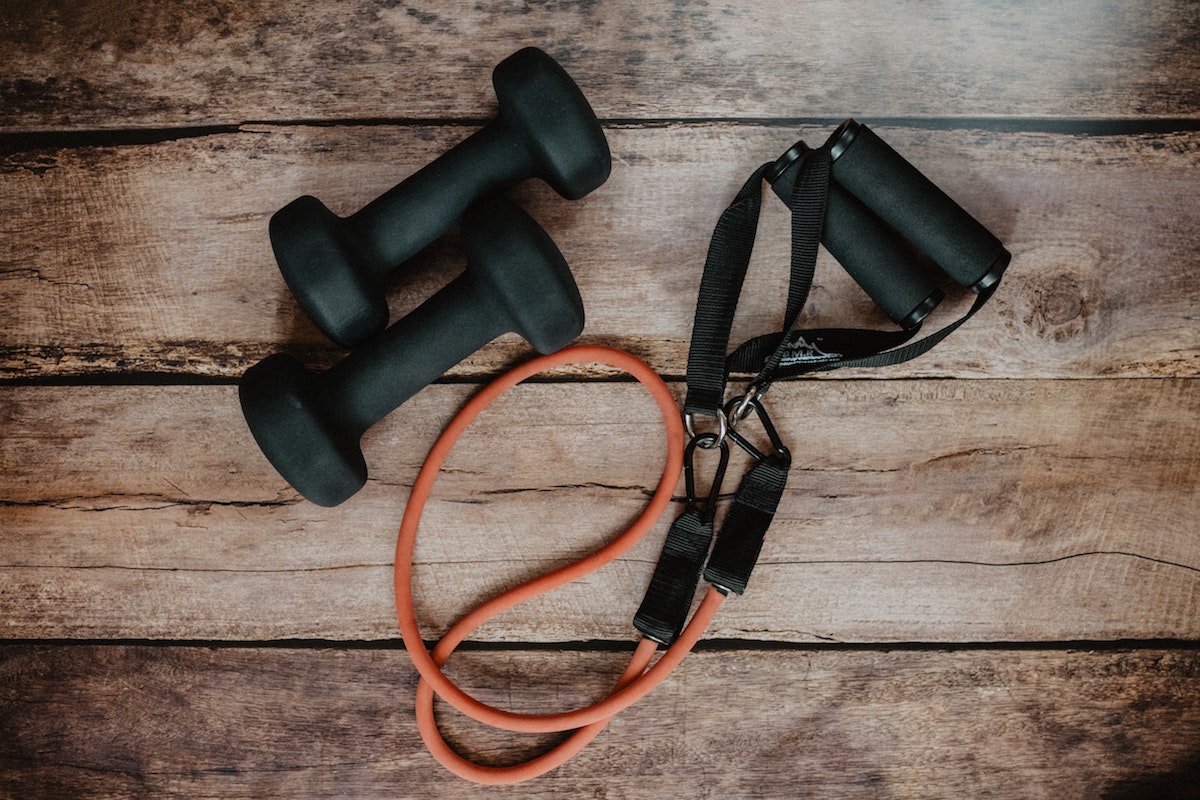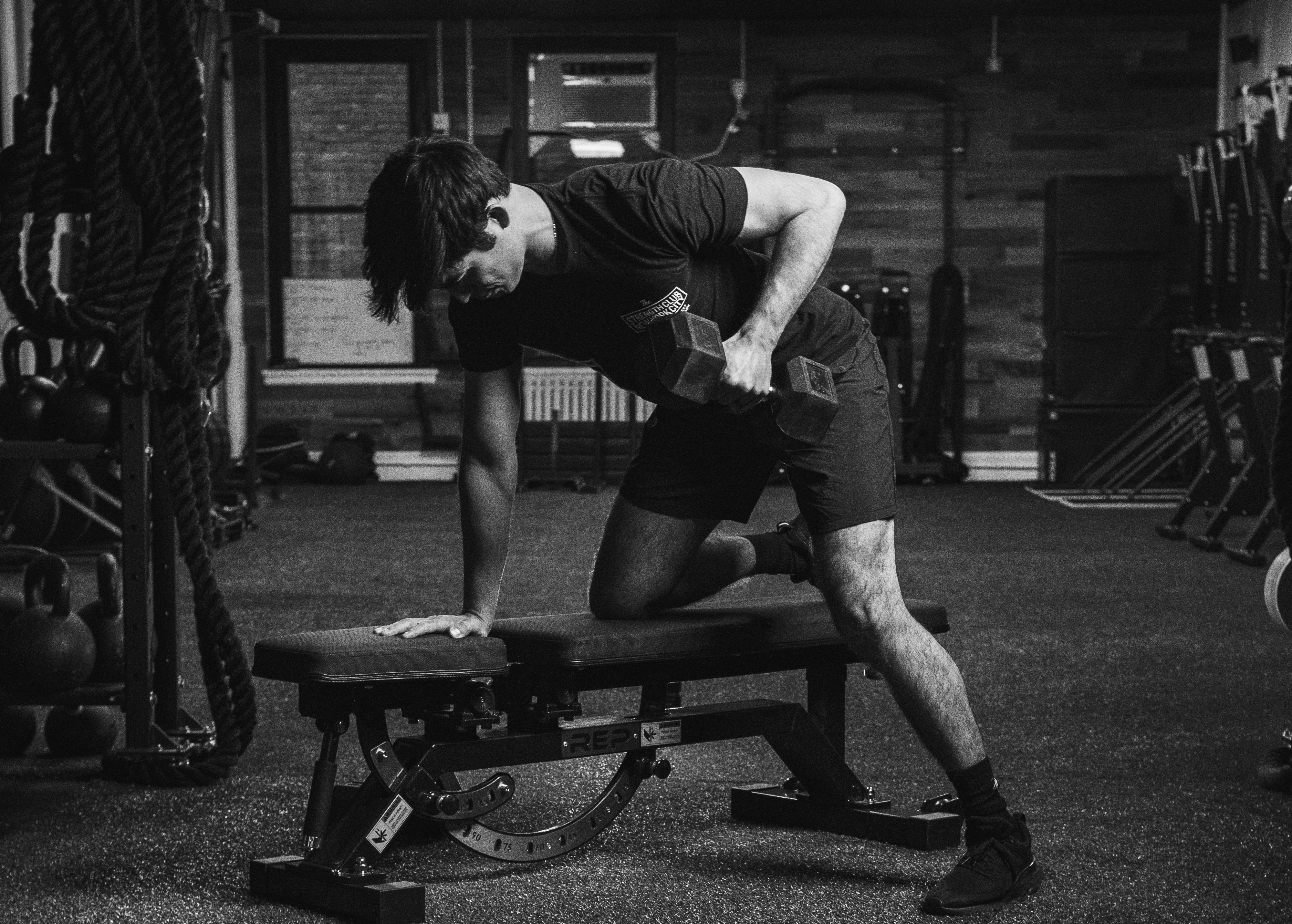
There are many approaches to building muscle, including calisthenics, weight training, and resistance bands. Resistance bands versus weights is a comparison that fitness enthusiasts regularly make because they are two distinct, effective approaches to gaining strength and muscle with the use of equipment.
Resistance bands are adaptable pieces of equipment that can be used anywhere, while weights make progressive overload easy and quantifiable. Which resistance training option is better for building muscle? Let’s find out.

What are the benefits of weights?
Progressive overload
Researchers agree that progressive overload is an important resistance training principle. It involves gradually increasing the stress placed on the body or muscles during exercise. Weight training makes progressive overload easier because all you have to do is gradually increase the weight.
Aside from making it easier, weight training also makes progressive overload quantifiable. If, for instance, you’re training with a barbell, you can progressively overload by simply adding two plates to each side of the bar. This way, you know the exact number of plates you now need to perform said exercise.
Variety and versatility
With weights, you have a wider range of options. For one, you can choose between machines and free weights. If you choose machines, you can choose between selectorized and plate-loaded machines. And if you decide to go with free weights, you can select between dumbbells, barbells, and kettlebells.
With all these types of equipment at your disposal, you also have a variety of exercise options. For example, if you don’t fancy a military press, you could perform a dumbbell shoulder press. If you have a shoulder press machine, you could use that, too.
Increased intensity
Weights allow you to push yourself as far as you can, and research has shown that high-intensity training is optimal for muscle growth. Depending on your strength levels, you can lift very heavy loads to instigate growth.
While other resistance training media like bands and calisthenics instigate muscle growth, there is a limit to how much resistance they can provide your muscles. With weights, on the other hand, you can experiment with enough load for even a one-rep max, tasking your nervous system and pushing your strength levels to their limits.

What are the benefits of resistance bands?
Portability
Resistance bands can be easily carried around — you can take them to work, school, and even on a trip. They offer a lightweight way to task your muscles to instigate growth, making them a suitable option for people who like to work out on the go.
Adaptability for all fitness levels
People who are new to working out can take advantage of resistance bands’ adaptability. There are many reasons why people are reluctant to start working out. One of them is that they’re afraid other people will judge or criticize them for not being strong enough. Resistance band workouts are one way to get around this.
You don’t have to lift any weights, so no one can say what you’re lifting is too light. Also, since they are portable, you can just work out with resistance bands at home instead of going to a gym.
However, resistance bands are not only for beginners. Intermediate and expert gym goers can also benefit from resistance bands’ adaptability because they have varying levels of resistance. You can choose a strength and texture that suits your strength levels.
Joint safety
Resistance bands can build muscle with a mild impact on your joints. Other resistance training media, like weights, may put too much pressure on your joints and cause injury if you go too heavy or ignore proper form. Resistance bands, however, offer a controlled resistance that reduces the chances of over-exertion.
With bands, people who are just returning from injury can safely test their joint and range-of-motion limits, reducing the chances of getting injured again.

Do weights or resistance bands help you build muscle better?
Both resistance bands and weights have big pros for muscle growth. Resistance bands are cost-effective, portable, versatile, and adaptable. Weights, on the other hand, are better for progressive overload and strength gain.
Whether either will help you build muscle better depends on your strength levels and specific training context. If you are an advanced lifter, weight training may be better for you because it allows you to lift much higher loads to suit your strength levels. In the same way, if you’re looking for training that is adaptable to different situations and equipment, resistance bands may be the way to go.
However, in the long run, weight training may be your best bet for maximizing muscle growth because there are no limits to how intense you can make your workouts. With weights, you can lift as much as you need to for maximal intensity and growth.

Can you use weights and resistance bands for all the same exercises?
Even though weights vs resistance bands is a popular comparison topic, both weights and resistance bands can be used for the same exercises.
One important advantage of resistance bands is their adaptability. Most exercises you can perform with weights can be simulated with resistance bands. Chest presses, squats, rows, and shoulder presses can all be done with resistance bands.
However, when using both weights and bands, exercise setup and execution are essential. With weights, you have to be careful to lift with proper form. With resistance bands, on the other hand, you must carefully hold the bands in place so that they don’t snap out and hit your skin.

How to choose the equipment that works for you
To foster consistency, it is important to choose exercise options that fit into your best workout schedule. Resistance bands work perfectly if you are on the move a lot and do not have access to weights or a gym. On the flip side, weights are more suitable for strength training and progressive overload.
Additionally, resistance bands offer a variety of options, not only for muscle building but also other training forms like plyometrics, stretching, and speed training. So, while weights may be more effective for muscle and strength gain, especially long-term, bands are more versatile for different types of training.
If your goal is to build muscle and you can’t access a gym consistently, using both resistance bands and weights in your training is advisable. You can use bands for exercises where you don’t need too much intensity and weight-train when you need heavy loads. Both resistance training options are effective and have their place in any well-adapted training program.
Editors' Recommendations
- Anyone can do Chris Hemsworth’s 15-minute resistance band workout
- 5 effective resistance band back exercises to add to your workout
- Weight training tips: This is what — and when — you should be eating
- 6 essential exercises that will help you get better at pull ups
- 10 essential exercises for men to build their glutes



